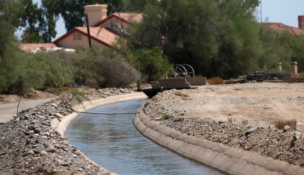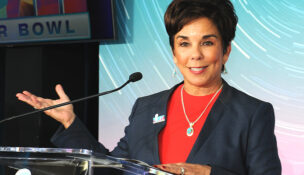Supreme Court hears Goddard’s plea for immunity in defamation
Arizona Capitol Reports Staff//October 5, 2007//[read_meter]
Supreme Court hears Goddard’s plea for immunity in defamation
Arizona Capitol Reports Staff//October 5, 2007//[read_meter]
ddard and a land developer addressed the Arizona Supreme Court in a Coolidge high school auditorium on Oct. 2 over the degree of immunity from defamation lawsuits that should be held by the attorney general.
Attorneys for Goddard asked the high court to upgrade the current standard of qualified immunity from defamation claims to absolute immunity, which would make him impervious to such lawsuits from citizens.
Possibly at stake is the survival of a $40 million lawsuit targeting Goddard, the Office of the Attorney General and several government agencies. That suit was filed by developer George Johnson who says Goddard defamed him in a February 2005 press conference in which Goddard announced an indictment accusing the builder of severely damaging public lands in Pinal and Apache counties.
“If he gets absolute immunity then pretty much any defamation lawsuit against him will not lie (be legally possible),” said Johnson attorney Michael Kitchen. “Then there is no case.”
Assistant Attorney General Lisa Hudson began arguments before the state Supreme Court justices, court clerks and approximately 150 Coolidge High School students and several teachers.
She appealed for full defamation immunity, stating the power is needed by the attorney general to inform citizens of litigation, to prosecute cases without fear of legal retaliation and to prevent “extremely cumbersome” fact-finding ventures necessary to address defamation lawsuits.
“One of the primary purposes of absolute immunity is to save the official from having to go through the rigors of discovery and trial,” Hudson said.
The absolute immunity privilege would also help attract people to public service and protect the attorney general from liability stemming from multi-state lawsuits, said Hudson.
The high court’s justices interrupted on numerous occasions, questioning why current protections from defamation claims are not sufficient, and the need and effects of granting an attorney general complete immunity from defamation suits.
In response to Hudson’s claim, a derivative from the 1959 U.S. Supreme Court case ~Barr v. Mateo~, that “having an informed electorate is a very basic and essential need of government,” Chief Justice Ruth McGregor questioned whether freeing an attorney general from defamation liability best serves the public, particularly individuals.
“That leaves a private litigant whose life and business might have been completely destroyed with no personal remedy,” said McGregor. “Don’t you think there is a really strong government interest to balance against that harm≠”
Others on the bench asked how a determination would be made to conclude which officials qualify for absolute immunity, if the power should be extended to assistant attorneys general and how the power would benefit the public.
Justice Scott Bales, examining if a more narrow approach could be taken besides granting absolute executive immunity, inquired whether alleged defamatory statements in a February 2005 press release by Goddard announcing charges against Johnson were not included in the filed charges against the developer.
Hudson answered affirmatively, but characterized several pointed accusations, including Johnson’s “wanton destruction of Arizona’s resources,” as “reasonable” and “fair comment” judging by pictures of the results of alleged environmental damage by Johnson.
The assistant attorney general also stated that several factors minimize the likelihood of an attorney general exploiting absolute immunity to damage citizens, including court sanctions, disbarment and “intense media scrutiny.”
“All of those help to balance and minimize the likelihood that somebody in the Attorney General’s Office will misuse his office,” said Hudson, who could not answer how many attorneys general have been sued for defamation in the state’s history.
Oral arguments on behalf of Johnson were handled by Thomas Zlaket, a former Arizona Supreme Court chief justice, who blasted the attorney general’s case for defamation immunity as “purely and simply a request for more power.”
“The attorney general has not given one good reason — not in the trial court, not in the Court of Appeals and not here today — why he as a public official should be able to knowingly and maliciously defame another citizen during one of his many press conferences,” Zlaket said.
McGregor stated that the Attorney General’s Office arguments center from a position advocating “an effective and efficient government process,” and not for a request by Goddard for more individual might.
Zlaket described that position as a “created reason,” noting the qualified immunity standard established in the 1986 Arizona Supreme Court decision in ~Chamberlain v. Mathis~ has yet to hamper an Arizona attorney general’s ability to prosecute cases.
The Tucson attorney further argued that an attorney general is not legally bound to make public announcements, but agreed under prodding by Vice Chief Justice Rebecca White Berch that press conferences and releases are an “accepted” part of public office.
But that fact doesn’t support the need for the high level executive immunity, said Zlaket, who described what he perceived as a wide and very frequent assortment of releases from Goddard’s office as “non-stop public relations.”
Questions directed at Zlaket by the justices also focused on judicial privilege of lawyers to accuse others in court filings (which could contain defaming allegations) and to what extent that power is affected if lawyers approach reporters, vice versa, or if reporters freely obtain filings and write articles about them.
“When I as a lawyer go down to the courthouse and file a complaint… that document carries with it a judicial privilege,” said Zlaket. “When I go outside the courthouse and call a press conference and start talking about what is contained in that I may be out on the fringes of what I am privileged to say because that press conference is not part of the judicial proceeding.”
He further urged the court not to “abandon” the “thoughtful” and “well-reasoned” qualified immunity standard established in Chamberlain, which included an objective malice requirement for defamation suits against executive government officials.
But he was cut off by McGregor, who interjected that Chamberlain did not cover high-level executive immunity. Moments later, Justice Michael Ryan noted the case pertained to a director of the Arizona Department of Health Services, a position much different than the attorney general.
Ryan further questioned if certain natural deterrents to defamation by an attorney general, including state bar discipline, recall, and loss of an election, provided “ample checks” to the sought executive immunity.
“No,” said Zlaket. “If you’re the person defamed do you think it’s any consolation we can throw him out of office the next time around≠”
Arizona State University law professor Paul Bender, who has been following the case, estimated Goddard stands a slim chance of gaining the additional protection from defamation suits.
Doing so would signal a reverse from traditional Arizona Supreme Court rulings that “consistently ruled against giving officials immunity,” and run counter to the state Constitution, which guarantees citizens’ rights to sue for damages.
But the court’s current members have surprised him a few times. And several new justices might be interested in bolstering the power of executive officials, said Bender.
“If I had to guess I would guess they would (uphold qualified immunity), but I wouldn’t put a lot
of money on it,” he said.
Four Arizona Supreme Court Justices heard Goddard’s appeal. Division II Court of Appeals Judge William Brammer filled in for Justice Andrew Hurwitz, who recused himself from the case.
















